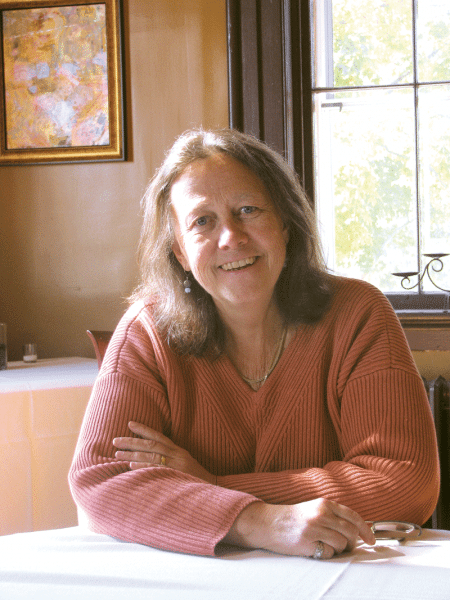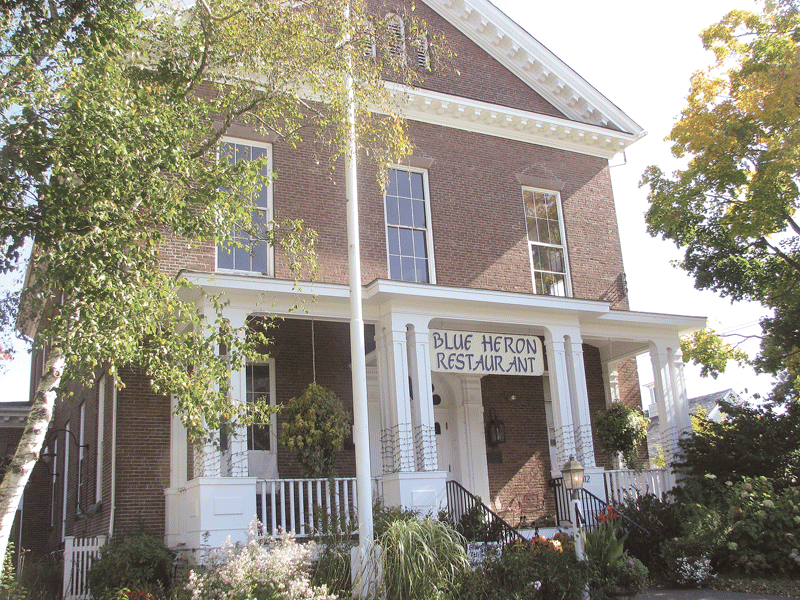Blue Heron Focuses on Globally Inspired, Locally Sourced Fare
Farm Fresh
The menu at the Blue Heron Restaurant & Catering lists more than 25 farms in Western Mass. that supply the Sunderland restaurant with fresh meat, produce, and dairy products. Co-owner Deborah Snow says that’s just an extension of what she learned as a child growing up on a farm in Ohio.“I came from a food family — today they would be called foodies,” she said. “They were from agricultural backgrounds. I lived on a farm until I was 2; my parents were farmers who loved to eat good food. They had experimental tastes for that time, even though we didn’t have access to a lot of global cuisine back then. They were great cooks; my mother was a pastry chef.”
Though the phrase ‘farm to table’ hadn’t yet been coined, “that was the roots of my family; you ate what was fresh,” Snow went on. “It was all oriented to seasons. I don’t remember having tomatoes in the house if it wasn’t tomato season. My family wouldn’t eat corn if it wasn’t picked that morning. It’s just how I grew up.”
As a child, Snow fantasized about owning a restaurant, but chose instead to study art history and photography in college, aiming for a career in art and, in the early ’80s, landing a photography exhibition for the United Nations.
“But I’ve worked in the restaurant industry since I was 14,” she added, with an aunt and uncle who ran a diner and another aunt and uncle with a catering business. Years later, that experience led her to shift her career focus. “When you’re a struggling artist, you need to get money somewhere, and one day I said, ‘I can actually make more money in the food business.’”
Still, she found that the food world was no hindrance to her goal of being an artist — it simply represented a different kind of art.
“I found a great deal of creativity in being a chef,” she told BusinessWest, but she didn’t want to own her own business at first, working instead for a large catering company in Boston. “That’s where I feel I really grew in knowledge. The best teacher is just getting in and doing it.”
Her many different forays into the culinary world convinced her that her passion truly lay there, she explained, adding that passion is a must to succeed in such a challenging industry. “Everyone wants to be a chef until they understand how grueling it is. And the financial rewards are not like being an IT person. It’s not like creating code.”
After running a small restaurant in Boston, she moved to Western Mass. and worked as the prepared food manager at Bread and Circus, then took catering jobs with Amherst College and Northfield Mount Hermon School, where she met her eventual partner in business and in life, Barbara White.
Taking the Leap
White took a similarly circuitous route into food service. She began her career as an elementary-school teacher, worked in an alternative school in the 1970s for a few years, moved to Massachusetts, and ran community-based mental-health programs for teenagers. At Northfield Mount Hermon School, where she worked first as a campus dean and later as director of parent programs, she decided to launch a catering business with Snow, which led to the Blue Heron.
“She was an educator and administrator, but she always had this desire to be in the hospitality business, so that’s what we did,” Snow said, adding that the restaurant initially opened on the banks of the Sawmill River in Montague in 1997 and quickly caught on with the dining public.

Deborah Snow says the Blue Heron was focused on locally sourced food long before it became an industry buzzword.
With the customer base growing, Snow and White went looking for a new, larger location, and found an ideal spot in the Old Town Hall in Sunderland, which had fallen into disuse for almost a decade. After purchasing the property from the city for $1 and undertaking an extensive remodeling job, the Blue Heron reopened in 2004.
“It’s a great thing that towns are willing to do that with buildings that are burdensome to them,” Snow said. “It’s an old public building, and we found a way to reuse it. It was getting damaged, and there were leaks, and it was obvious the town didn’t want to keep it. We fit the profile of what they wanted to see — something that would increase their tax base and also bring people to the area, which we do.”
Built in 1867 to house the Sunderland town offices and grammar school, the building has served myriad municipal functions over the years. The first floor and basement were remodeled in the 1940s, but the second floor retains its original construction, including the Great Room’s pressed-tin walls and ceilings.
To White and Snow, the building was a satisfying challenge, since they already shared a love for old structures. “Barbara and I live in a house built in the late 1820s, early 1830s, and we’re in the process of working on that,” Snow said. “We love the character of an old building; we love the reuse.”
She talked with BusinessWest in the bar area, which used to be a small basketball court that doubled as a function area for various town activities. “Customers say, ‘I used to play ball here, and my daughter did ballet upstairs.’ We hear wonderful stories.”
Now, the partners are hoping to create new memories for diners through fresh, eclectic food in a striking, historic setting.
“Our motto is ‘globally inspired, locally sourced.’ I traveled a lot as a photographer, as did Barbara.” Her experience with the UN led Snow to the Middle East and Far East, where she always sought out local cuisine, not fare aimed at American tourists. “They really opened their hearts. I wanted to create food from the tastes I had around the world.”
When the Blue Heron first opened, however, exotic ingredients were harder to find than they are in 2015, when even the most Americanized grocery stores carry a wide range of Asian, Indian, and Middle Eastern sauces and spices. However, while the ‘globally inspired’ aspect of their philosophy has evolved with the greater choices available today, the ‘locally sourced’ aspect was strong from the start.
“The meat for our burgers comes from Foxbard Farm, 20 miles away; it’s all grass-fed,” Snow said. “We go that extra mile and spend more money on all our meats than many restaurants. We’re not only doing that now; we were the only ones doing that when we opened. That’s our commitment, and for us, that never changes.”
It also provides incentive to change the menu seasonally; rather than tomatoes and corn and berry-centric desserts, the fall and winter will see increased usage of potatoes, carrots, parsnips, turnips, and kale.
Moving On Up
While she no longer cooks on a nightly basis, Snow remains active in designing the menu, and she relishes the challenge of party bookers who request traditional ethnic dishes, from Indian to Mexican to Chinese.
“I love all those foods,” she said. “For one wedding, the groom was from India, and the bride was from around here. They wanted me to do a lamb biryani. I hadn’t made it before, but I studied, went out and tasted some, and made it for their wedding. They said it was the best they’d ever had.”
That kind of response, Snow said, is gratifying, and begins with a philosophy that fresh, local food beats freezers and powders — and it has helped her and White carve out one of Franklin County’s tastiest success stories.
Joseph Bednar can be reached at [email protected]





